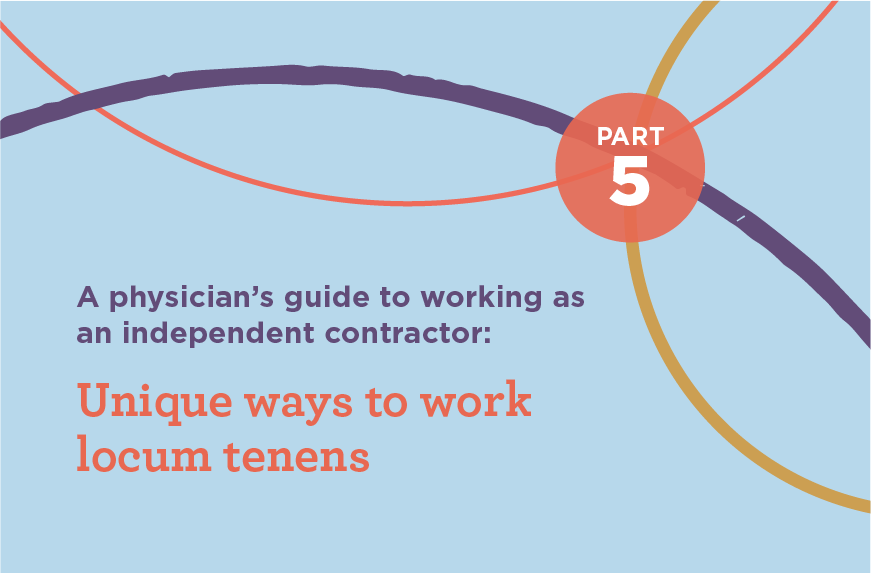This is the last part a five-part series on everything a physician needs to know about working as an independent contractor. If you missed previous articles, you can read them here:
- Part One: Getting started with locum tenens
- Part Two: Working with a locum tenens agency
- Part Three: How to prepare for a locum tenens assignment
- Part Four: How locums pay, malpractice, and taxes work
Part five: Unique ways to work locum tenens
Locum tenens is a highly flexible career alternative for physicians with a variety of options depending on your wants, needs, and career stage. While many physicians make locum tenens their full-time career or work part-time on the side, here are some other unique ways locums can help physicians work the way they want.
Travel abroad with international locum tenens
While some providers prefer to take jobs in the United States, others want to explore the world and work locum tenens internationally. If you’re interested in leaving the country, keep a few things in mind:
- International assignments usually require much longer time commitments than domestic assignments because of the time and paperwork it takes to secure visas and credentials in another country. While some assignments to Guam or the U.S. Virgin Islands can be as short as three months, most require at least six months, and others are as long as nine months or a full year.
- The school year in some countries, like New Zealand and Australia, starts in January, so it can take some planning if you want to bring family on an assignment and not disrupt their school schedule.
- Many clients advertise international locum tenens jobs six to nine months in advance, so it’s important to start speaking to a recruiter early to get the process started.
Despite the challenges, many providers say their experiences on international assignments are invaluable.
“I love that I didn’t have to work the weekends and could travel. I got to see and do a lot. We could put the real-life stuff on hold because there really wasn’t much real-life stuff to do out there except work and pay a few bills, and that was it,” says Dr. Jason Lambrese, who worked in New Zealand right out of residency with Global Medical Staffing. “I had that freedom to adventure and to explore a lot more than I give myself time to do here (in the U.S.).”

International 101: The beginner’s guide to international locum tenens assignments
Using locum tenens to find a permanent position
Some physicians use locums as a way to work in a variety of practice settings and geographic regions before taking a permanent position. If you’re interested in this option and want a locum tenens assignment to eventually turn into a permanent position (if the facility is interested), follow these suggestions:
- Work locum tenens soon after completing your fellowship or residency
- Get to know the community whenever you take a new assignment
- Ask your recruiter why the hospital where you work hires locum tenens and whether they would be interested in hiring a full-time physician
- Develop relationships with other physicians and support staff at each facility where you work
Easing into retirement
Some physicians who are nearing retirement are unsure how to navigate a more part-time schedule, and locum tenens assignments can help. Benefits of using locum tenens to transition to retirement include:
- Choose long-term assignments so you can enjoy the area where you’ll be working
- Think of locum tenens work as a way to continue helping others and doing something you’re good at
- Consider selling your private practice and taking locum tenens jobs back to back
- Take short breaks when you need a vacation or break rather than retiring completely
- Choose a different practice setting if you’re burnt out from years of private practice
Find out: Why these 5 physicians continued practicing after retirement
Ready to get started working locum tenens?
CompHealth can help you with everything becoming an independent contractor requires while working locum tenens. Call us at 800.453.3030 or click the button below to get started.
Go back to Part Four: How locums pay, malpractice, and taxes work
 Blog
Blog